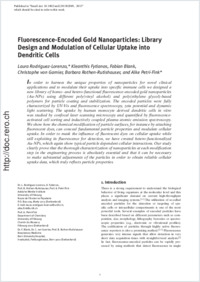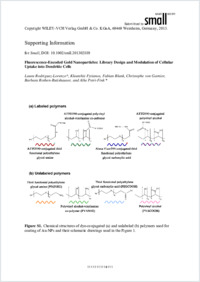Fluorescence-encoded gold nanoparticles: library design and modulation of cellular uptake into dendritic cells
- Rodriguez-Lorenzo, Laura Adolphe Merkle Institute, University of Fribourg, (Switzerland)
- Fytianos, Kleanthis Adolphe Merkle Institute, University of Fribourg, (Switzerland)
- Blank, Fabian Respiratory Medicine, Bern University Hospital, Inselspital, (Switzerland)
- Garnier, Christophe von Respiratory Medicine, Bern University Hospital, Inselspital, (Switzerland)
- Rothen-Rutishauser, Barbara Adolphe Merkle Institute, University of Fribourg, (Switzerland) - Respiratory Medicine, Bern University Hospital, Inselspital, (Switzerland)
- Petri-Fink, Alke Adolphe Merkle Institute, University of Fribourg, (Switzerland) - Department of Chemistry, University of Fribourg, Fribourg, (Switzerland)
-
2014
Published in:
- Small. - 2014, vol. 10, no. 7, p. 1341–1350
Cellular uptake
Human dendritic cells
Gold nanoparticles
Encoded particles
Surface functionalization
English
In order to harness the unique properties of nanoparticles for novel clinical applications and to modulate their uptake into specific immune cells we designed a new library of homo- and hetero-functional fluorescence-encoded gold nanoparticles (Au-NPs) using different poly(vinyl alcohol) and poly(ethylene glycol)-based polymers for particle coating and stabilization. The encoded particles were fully characterized by UV-Vis and fluorescence spectroscopy, zeta potential and dynamic light scattering. The uptake by human monocyte derived dendritic cells in vitro was studied by confocal laser scanning microscopy and quantified by fluorescence-activated cell sorting and inductively coupled plasma atomic emission spectroscopy. We show how the chemical modification of particle surfaces, for instance by attaching fluorescent dyes, can conceal fundamental particle properties and modulate cellular uptake. In order to mask the influence of fluorescent dyes on cellular uptake while still exploiting its fluorescence for detection, we have created hetero-functionalized Au-NPs, which again show typical particle dependent cellular interactions. Our study clearly prove that the thorough characterization of nanoparticles at each modification step in the engineering process is absolutely essential and that it can be necessary to make substantial adjustments of the particles in order to obtain reliable cellular uptake data, which truly reflects particle properties.
- Faculty
- Faculté des sciences et de médecine
- Department
- Département de Chimie
- Language
-
- English
- Classification
- Chemistry
- License
-
License undefined
- Identifiers
-
- RERO DOC 209275
- DOI 10.1002/smll.201302889
- Persistent URL
- https://folia.unifr.ch/unifr/documents/303489
Other files
Statistics
Document views: 140
File downloads:
- pdf: 378
- Supplementary material: 184

